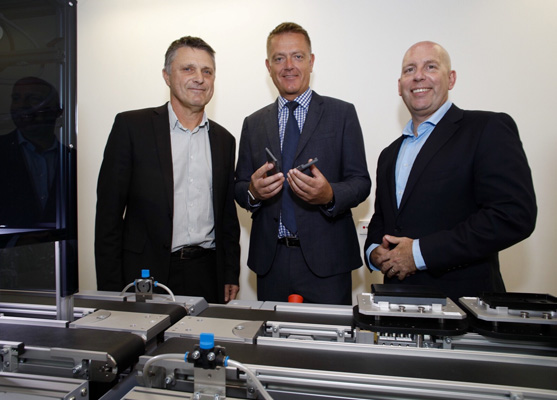Factory of the Future opens at Tonsley
World-class advanced manufacturing training drives Industry 4.0 innovation
Adelaide is now home to one of the few Future Factories in the Southern Hemisphere with the opening of the state-of-the-art Tonsley Manufacturing Innovation (TMI) Hub today.
The centrepiece of new TMI Hub is the modular Future Factory. Made in Germany by technology giant Festo, it showcases the latest automation, sensor, monitoring, robotic and cobotic technologies and provides the opportunity for world-class education and training in advanced manufacturing within a research environment.
This includes the Bionic Handling Assistant – a cobotic gripper arm modelled on the structure and function of an elephant’s trunk.
Located in the award-winning Tonsley Innovation Precinct (the former site of Mitsubishi’s automotive manufacturing in Australia), the Hub is being driven by Flinders University, the South Australian Government and the Innovative Manufacturing Cooperative Research Centre (IMCRC).
The TMI Hub will provide practical training and real-world research opportunities for students, researchers and businesses wanting to learn more about automation, advanced robotics and the Internet of Things.
It will tap into the work of mature global companies, local enterprises and start-ups already located at Tonsley including Siemens, Zeiss Vision, ZEN Energy and SAGE Automation, as well as extending its training reach into the State’s fast-growing defence industry and the advanced manufacturing sector nationally.
The Director of the Australian Industrial Transformational Institute, Professor John Spoehr, says the TMI will play a catalytic role in promoting the understanding and application of the Industry 4.0 (i4.0) agenda, including robotics and automation in highly networked and flexible cloud-based production systems.
“The TMI will showcase the latest generation of Future Factory technologies which are revolutionising the way we design and make things,” says Professor Spoehr.
“It’s a prime example of how traditional manufacturing is making way for advanced manufacturing in the new economy.
“TMI will play a key role in accelerating the growth of advanced manufacturing by skilling our future workforce, with the adoption of digital technologies in South Australia giving rise to a new generation of manufacturers and highly skilled jobs.
“It will also help organisations to build their i4.0 capabilities through accredited and non-accredited education and training programs.
“Companies that engage with the TMI will greatly improve their chances of successful participation in defence supply chains to tap into the $90 billion worth of shipbuilding projects taking place in South Australia.
“Flinders welcomes the opportunity to partner with the State Government and the Innovative Manufacturing CRC to establish a truly world-class facility at Flinders University at Tonsley.”
The TMI provides industry and researchers with the technologies to design, visualise and test production processes in a virtual environment to greatly mitigate risk prior to physical production.
The TMI goes hand in hand with Flinders University’s new Innovative Manufacturing Accelerator Program which from 2018 will support manufacturing-based companies to fast-forward product development and commercialisation processes.
David Chuter, IMCRC CEO and Managing Director, says that the opportunity to catalyse investment in South Australian manufacturing is exciting.
“The IMCRC embraced the opportunity to work strategically with the South Australian Government and Flinders University, investing collaboratively to identify projects with the potential to ignite innovation and catalyse manufacturing growth,” he says.
“The South Australian Government should be applauded for its foresight to invest in the Future Factory as part of their financial contribution to IMCRC, making the innovation process tangible and accessible for manufacturers. This can now facilitate effective collaboration between the research community and industry through the utilisation of these technologically advanced facilities.”

